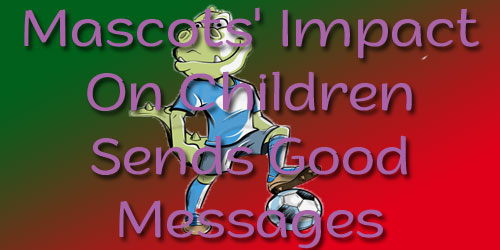 02 Jan 19
02 Jan 19
Mascots' Impact On Children Sends Good Messages
Young children and Mascot Mental Images
Mascots hold a solid mental image for many people that come in touch with one. But mascots effect on children is a lot stronger and serious than with any other age group. Young children often react with fondness to mascots that display positive characteristics. A kid may be delighted by the way a mascot dances or any amusing physical activity the mascot partcipates in. This is also true if a mascot is the embodiment of something that a kid wants his or her parents to buy for them. Mother and father are often vulnerable to the marketing industry. This is true since many items such as toys and games, games, and foods are ordered by parents on behalf of their children. Children is quite persistent in ensuring that their parents choose the most recent cereal or model because a mascot said it was great. In addition, children that are not yet literate may actually gravitate towards a mascot. Kids at this stage of development search for photos or symbols that symbolize familiar what to them.
Mascots as Tough Symbols
Children may be the most sensitive of most age ranges to mascots and their symbology. A grown-up may be able to discern if a product or graphic a mascot is portraying can be worthless, while a child could see something completely different. Before language skills are strongly developed, children tend to remember events and folks in snapshots like pictures in their stories. Mascot Design Agency may be able to grab a place within a child's mind which will be vivid and carry meaning into adulthood for the kid.
Good Vibrations
The positive emotions that mascots elicit from children are often connected with just what a mascot does and not just a product itself. In the case of sporting teams the mascots effect on children could be to excite or enthuse them concerning the team or a game occurring. Not to mention once again, kids may be drawn to the mascot on a personal level. Instead of wanting something lauded by a mascot, children might want something that represents the mascot like a: stuffed animal, shirt, pennant flag, or pin. Mascots in of themselves can be easily promoted to children to market team sales. Also, the mascot may inspire a new era of fans being realized by the team.
Mascots, Academic institutions, and Self-Image
Elementary schools around university campuses heavily make use of mascots to mention team impression and help in promoting team soul. Mascots impact on children is quite strong when coping with school mascots. Young children face the image normally on a daily basis. The school mascot could be present around the schools' outside signal or over the wall or surface of the fitness center. Also, young children who play activities may dress in uniforms that have the mascots proudly inserted upon them. Young children may come to view themselves as having lots of the same characteristics because the mascot should they participate in group sports. For this reason mascots that enhance a positive photo are very important for school aged youngsters. Negative mascots effect on children may enhance negative pictures of the school or perhaps even have an effect on a child's self-image.
Responsible Making of Mascots
Since mascots effect on children is seriously profound adults have a responsibility to generate mascots that send out a warm and optimistic message. They need to keep the greatest interest of children in mind when designing the costume for the mascot. Also, the actions of the Mascot Design Cost have become important. The individual portraying the mascot comes with an obligation to act fun and upbeat, without engaging in any behavior which could have a poor or harmful connotation. This can only help to paint the team or product in a confident light with not merely children, but parents as well.


Comments